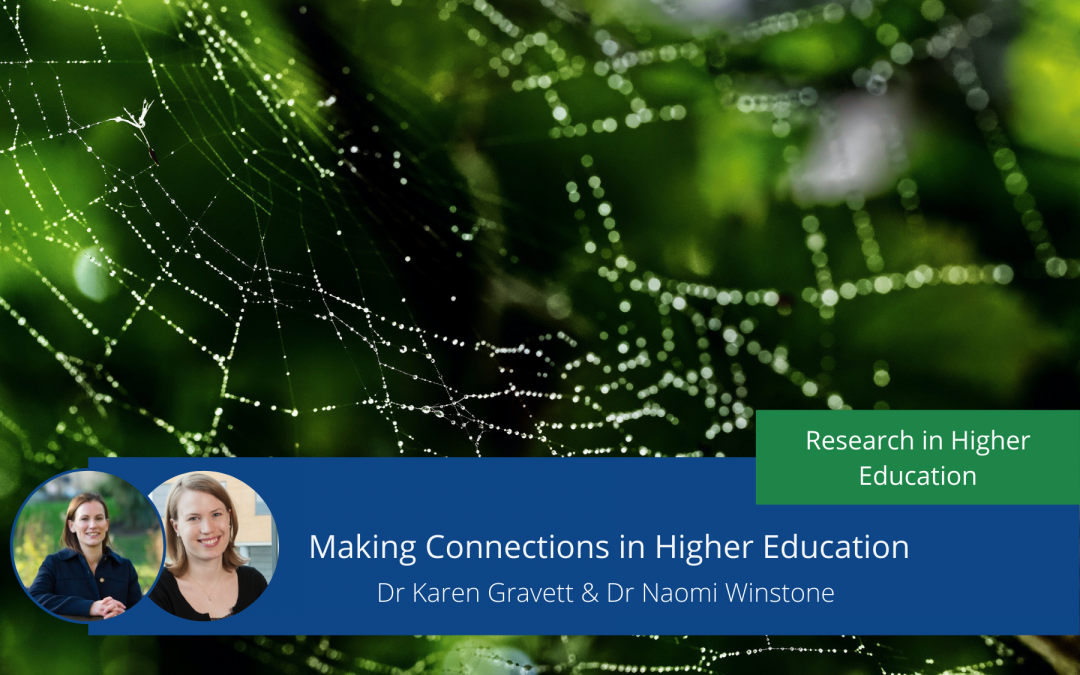
Making Connections in Higher Education
Relational Pedagogies
What does it mean to teach and learn in higher education today? And more importantly, what should, and could, it mean? These are fundamental questions that speak to the values that underpin our practice, and that shape the cultures we foster and work within and the experiences our students have as they transition into and through university. In recent work, we have suggested that despite the dominant discourses that focus on student satisfaction, that depict higher education as a product, and construct students as consumers, meaningful interpersonal relationships remain of paramount importance to both students and staff. Meaningful connections enable learning, and situating connections as fundamental to higher education can offer openings to reorientate the way we experience our work as educators.
This is a theme we have explored in our recent work. For example, using a creative story-completion method, we examined how relationships impact upon students’ experiences of higher education and surfaced the importance of relational pedagogies, where meaningful relationships are positioned as critical to effective learning and teaching. In this article, we drew upon data from a longitudinal study, in which students were invited to complete stories that enabled them to surface experiences and discourses surrounding relationships at university. Our data suggest that meaningful connections are crucial to accessing support. Most notable within the data were a number of key themes that recurred within the students’ stories and interviews.
Firstly, students reported that they desired the individuality of their experiences to be recognised. This resonates with other recent work examining how students experience belonging in higher education and highlighting the situated, granularity, and diversity of students’ experiences. Such work indicates a need to move away from understanding students’ experiences as universal and uniform. Second, our article surfaced the importance of achieving connections with others, and the experience of alienation when interactions are not genuine, or when communication breaks down. For students, feeling that they are understood and that they matter can be a fundamental part of their learning experience. In a broader sense, we can understand learning as situated within a wider web of relations, in which students do not exist independently and in isolation, but intra-act (Barad 2007). This leads us to ask new questions about how we want to engage with both our students, with one another, and encourages us to look again at the broader networks in which learning occurs.
From Metrics to Mattering
However, relational pedagogies, and the need for students to experience a sense of mattering, are situated against a backdrop of tensions within higher education learning environments that mean that such relationships cannot always develop. The higher education landscape has shifted dramatically towards a predominant focus on accountability and student satisfaction. At the same time, a wider era of global economic and health uncertainty means that students and staff often work and learn in contexts that are challenging for engagement. Within the neoliberal university, the student is positioned as a self-governing agent, as a consumer. Staff are under increasing pressures and experiencing high levels of workload and burnout. Our findings suggest that a greater understanding of the need to interact care-fully with our students is essential. In particular, we suggest that students need to be understood as more than customers, with diverse experiences, and that adopting such an understanding may enable more generative pedagogic relationships to develop. However, we also advocate the need to prioritise relational pedagogies, to find spaces for new conversations around relational learning to take place, and, crucially, for staff to be recognised and supported in their work developing learning.
Future Directions
There is further work to be done to understand more about what meaningful connections for students look like. This is an evolving area, generating key questions such as how we might foster connections when learning and teaching, as well as what broader sociomaterial actors might be involved in learning interactions, and how might we trace these practices and relations. Future work on relational pedagogies, connections, and mattering, to be published in 2022, will examine further the role of the relational within higher education and will argue that such a perspective offers an enriched understanding of higher education pedagogies that can be potentially transformative in creating the higher education pedagogies and practices we might want to be a part of. For now, we suggest that asking who and what matters within higher education, as well as acknowledging the importance of the relational, may be the first steps in moving towards creating opportunities for supporting staff to prioritise their connections with students. This might be in terms of increasing time for student-staff interactions, prioritising the value of teaching within institutions (and providing further resourcing), attending to the diverse day-to-day practices of learning interactions, or even just creating spaces for conversations regarding relational pedagogies to take place.
References and Further Reading
Barad, K. (2007). Meeting the Universe Halfway: Quantum Physics and the Entanglement of Matter and Meaning. Duke University Press. https://www.dukeupress.edu/meeting-the-universe-halfway
Gravett, K. and Winstone, N. E. (2020). Making Connections: Authenticity and Alienation Within Students’ Relationships in Higher Education. Higher Education Research and Development. https://doi.org/10.1080/07294360.2020.1842335
Gravett, K., Kinchin, I. M. and Winstone, N. E. (2020) ‘More than Customers’: Conceptions of Students as Partners Held by Students, Staff, and Institutional Leaders. Studies in Higher Education, 45 (12), 2574-2587. https://doi.org/10.1080/03075079.2019.1623769
Gravett, K. and Ajjawi, R. (2021) Belonging as Situated Practice. Studies in Higher Education. https://doi.org/10.1080/03075079.2021.1894118
Gravett, K. (due 2022) Connections and Mattering in Higher Education: Reimagining Relational Pedagogy, Practice and Research. London: Bloomsbury.

Dr Karen Gravett
Lecturer in Higher Education

Dr Naomi Winstone
Reader in Higher Education, Director of the Surrey Institute of Education
Dr Naomi Winstone is a Reader in Higher Education and Director of the Surrey Institute of Education at the University of Surrey, UK. Her research focuses on the processing and impact of instructional feedback and the influence of dominant discourses of assessment and feedback in policy and practice on the positioning of educators and students in feedback processes. She is also an Honorary Associate Professor in the Centre for Research in Assessment and Digital Learning (CRADLE) at Deakin University, Australia. Naomi is a Principal Fellow of the Higher Education Academy and a UK National Teaching Fellow.
